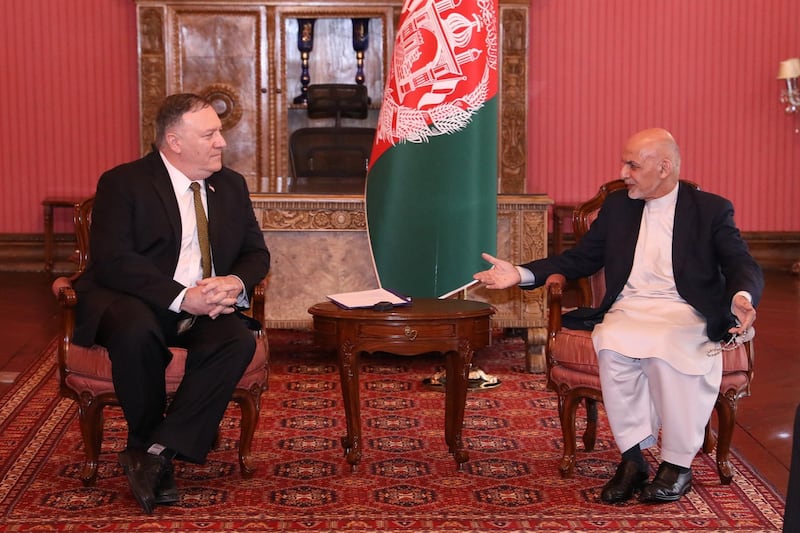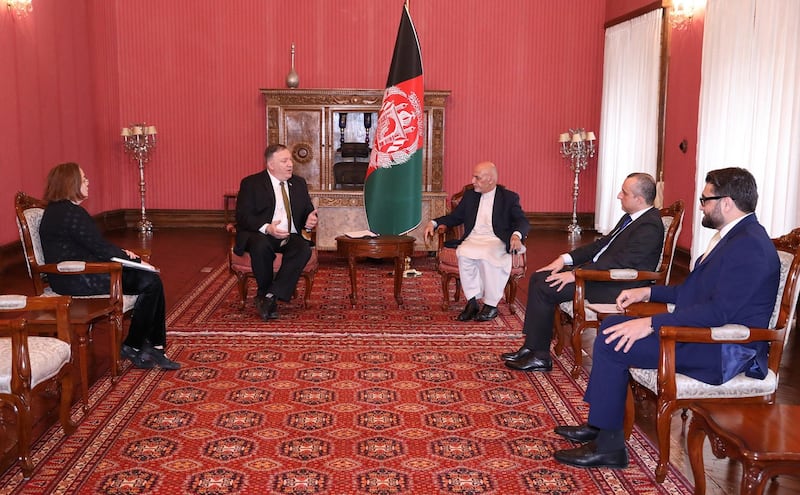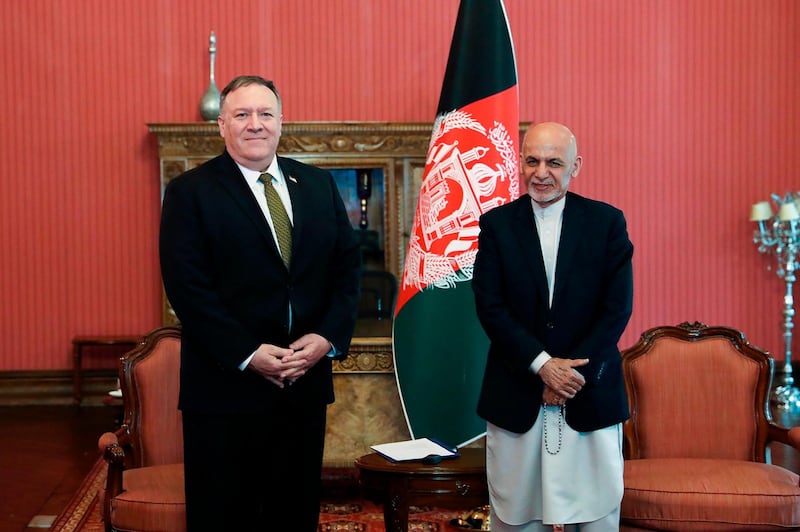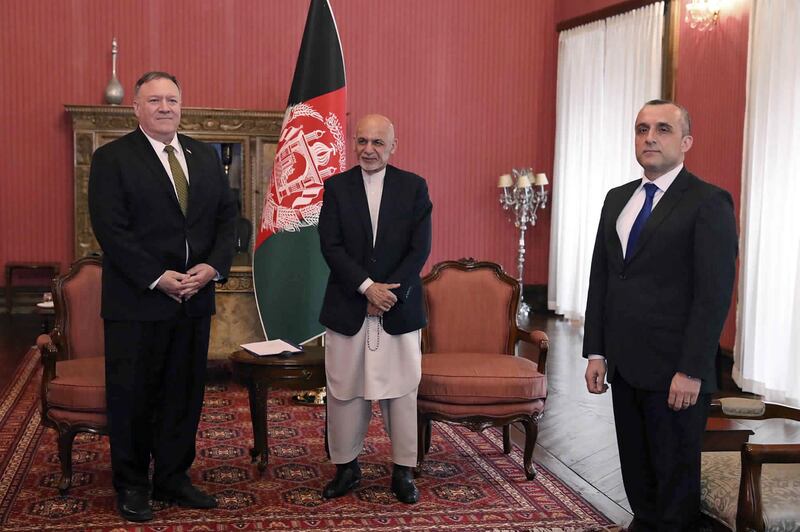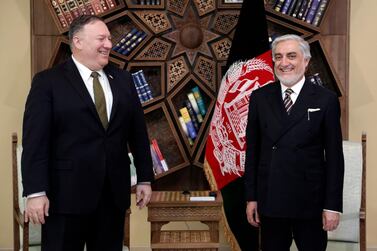The US administration is slashing $1 billion (Dh3.67bn) in assistance to Afghanistan and threatening further reductions in all support after rival leaders in Kabul failed to agree on a new government.
Secretary of State Mike Pompeo announced the cut on Monday after an unannounced visit to the Afghan capital to meet Ashraf Ghani and Abdullah Abdullah, the rivals who each declared themselves president after elections last year.
Mr Pompeo criticised the two men for being unable to work together and jeopardising a peace deal that could end America’s longest-running conflict.
He said the US deeply regretted that the two had told him “they have been unable to agree on an inclusive government that can meet the challenges of governance, peace and security, and provide for the health and welfare of Afghan citizens”.
Mr Pompeo said Washington was “disappointed” in both men and their conduct.
He said it had “harmed US-Afghan relations and, sadly, dishonours Afghan, Americans and coalition partners who have sacrificed their lives and treasure in the struggle to build a new future for this country”.
Mr Pompeo said their inability to work together posed a “direct threat” to US national interests.
He said the administration would begin an immediate review of all its support programmes for Afghanistan, starting with a reduction of $1bn in aid this year. When asked about where the money would be pulled from, he declined to comment.
“I don’t want to talk about the details of what we’re going to do. We’re hopeful, frankly, they’ll get their act together and we won’t have to do it, but we are prepared to do that if they can’t,” he said.
It could be reduced by another $1bn in 2021, he said.
“We have made it clear to the leadership that we will not back security operations that are politically motivated, nor support political leaders who order such operations or those who advocate for or support parallel government,” he said.
Mr Pompeo, who flew from Kabul to Doha to meet a senior Taliban official, said Mr Ghani and Dr Abdullah were acting in a manner inconsistent with their agreements to support a US-Taliban peace deal signed last month.
The agreement called for intra-Afghan peace talks to begin within 10 days, by March 10, but they have not begun.
Mr Ghani and Dr Abdullah had not even agreed on who should be part of the non-Taliban delegation, nor on prisoner swaps with the Taliban as envisaged by the deal.
Mr Pompeo said the US would continue to withdraw about 4,400 troops from Afghanistan in the coming months under the terms of its agreement with the Taliban.
He said Washington would be willing to reconsider the aid cuts if Mr Ghani and Dr Abdullah formed an inclusive government, and emphasised it remained committed to supporting the Afghan people.
As a demonstration of that, he said, the US would provide $15 million in assistance to help Afghanistan fight the spread of the coronavirus.
Mr Pompeo travelled thousands of miles despite a near-global travel shutdown because of the pandemic.
There were reports in Kabul that he had given Mr Ghani and Dr Abdullah until Tuesday to come up with a compromise.
From Kabul, Mr Pompeo flew to Doha, where he witnessed the signing of the US-Taliban deal on February 29, last time he travelled abroad.
There, he met Taliban officials including Abdul Ghani Baradar, a co-founder of the group and head of their political office in Qatar. Mr Baradar signed the agreement on the Taliban’s behalf.
The State Department said Mr Pompeo’s aim was “to press the Taliban to continue to comply with the agreement signed last month”.
Since the deal was signed, the peace process has stalled as Mr Ghani and Dr Abdullah remained deadlocked over the result of last September’s polls.
Mr Pompeo met Mr Ghani and Dr Abdullah separately on Monday before speaking to both men together.
The US pays billions every year towards the Afghan budget, some of which supports the country’s defence forces.
Afghanistan barely raises a quarter of the revenue it needs to run the country, giving Mr Pompeo considerable financial influence to force the two leaders to break the impasse.
The intra-Afghan peace talks that would include the Taliban are regarded as a critical next step in the peace deal, negotiated to allow the US to take home its troops and give Afghans the best chance at peace.
“We are in a crisis,” a State Department official said.
“The fear is that unless this crisis gets resolved soon, it could affect the peace process, which was an opportunity for this country that stood in this 40-years-long war.
“And our agreement with the Talibs could be put at risk.”
Washington and Nato have already begun to withdraw some troops from Afghanistan.
The final pullout is not dependent on the success of intra-Afghan negotiations, but on promises made by the Taliban to deny space in Afghanistan to other terrorist groups, such as ISIS.
Mr Ghani has also refused to fulfil his part of a promise made in the US-Taliban deal to release up to 5,000 Taliban prisoners.
The insurgents were to free 1,000 Afghan officials and soldiers they hold captive, an exchange meant to be a goodwill gesture by both sides to start the negotiations.
The urgency of Mr Pompeo’s surprise visit was highlighted by the fact that the State Department has warned American citizens against all international travel because of the coronavirus.
His visit was also extraordinary for the fact that the US, like the UN, earlier said it would not be drawn into mediating feuding Afghan politicians as it did in 2014 presidential polls.
While the Afghan election commission this time gave the power to Mr Ghani, Dr Abdullah and the complaints commission made allegations of widespread irregularities.
